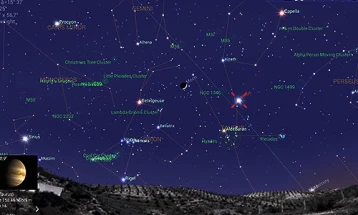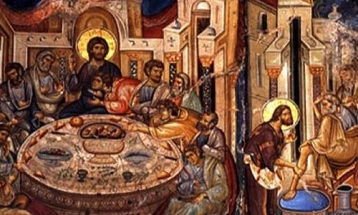Religious calendars
- 16 September 2024 (MIA)

16 September 2024 (MIA)
Macedonian Orthodox Church Calendar
The Hieromartyr Anthimus
Born in Nicomedia, he was brought up from childhood as a true Christian. ‘His body was mortified, his spirit humble; jealousy was uprooted, anger tamed, sloth banished. … he had love for all and was at peace with all, had a good understanding with all, was filled with zeal for the glory of God and was open to all.’ It is not surprising that a man of such virtues was made a bishop. St Anthimus worked as a bishop in Nicomedia at the time of a harsh persecution of Christians under the two wicked Emperors Diocletian and Maximian. Streams of Christian blood were spilled, especially in Nicomedia. One year, on the feast of the Nativity of Christ, twenty thousand martyrs were burned in one church (see Dec. 28th). This happened during Anthimus’s episcopate. The persecution did not end with this, but continued, and many Christians were thrown into prison and kept there for torture and death. St Anthimus withdrew to a village, Omana, not to escape death but to be able thence to strengthen his flock in the path of martyrdom, that none should draw back through fear. One of his letters to the Christians in prison was seized and taken to the Emperor Maximian. The Emperor sent twenty soldiers to find Anthimus and take him. The grey-beard, discerning this, went out to meet the soldiers, brought them into his house as his guests and only then revealed that he was Anthimus. The soldiers, amazed at his kindness, urged him to hide, and said that they would tell the Emperor that they had been unable to find him, but Anthimus replied that he dared not allow God’s Law to be violated by a lie in order to save his life. So he set out with the soldiers. On the way, all the soldiers came to faith in Christ and were baptised by Anthimus. Brought before the Emperor, Anthimus was submitted to harsh and long-drawn-out torture, and was finally beheaded with an axe. He glorified God and entered into rest in the Lord at the beginning of the fourth century.
Catholic Calendar
St. Cornelius
Cornelius whose feast day is September 16th. A Roman priest, Cornelius was elected Pope to succeed Fabian in an election delayed fourteen months by Decius’ persecution of the Christians. The main issue of his pontificate was the treatment to be accorded Christians who had been apostasized during the persecution. He condemned those confessors who were lax in not demanding penance of these Christians and supported St. Cyprian, Bishop of Carthage, against Novatus and his dupe, Felicissimus, whom he had set up as an antibishop to Cyprian, when Novatus came to Rome. On the other hand, he also denounced the Rigorists, headed by Novatian, a Roman priest, who declared that the Church could not pardon the lapsi (the lapsed Christians), and declared himself Pope – the first antipope. The two extremes eventually joined forces, and the Novatian movement had quite a vogue in the East. Meanwhile, Cornelius proclaimed that the Church had the authority and the power to forgive repentant lapsi and could readmit them to the sacraments and the Church after they had performed proper penances. A synod of Western bishops in Rome in October 251 upheld Cornelius, condemned the teachings of Novatian, and excommunicated him and his followers. When persecutions of the Christians started up again in 253 under Emperor Gallus, Cornelius was exiled to Centum Cellae (Civita Vecchia), where he died a martyr probably of hardships he was forced to endure.
Cyprian of Carthage
Born to wealthy pagan parents. Taught rhetoric and literature. Adult convert in 246. Priest. Bishop of Carthage in 249. Writer. Latin Father of the Church. Exiled during the persecutions of Valerian. Friend of Saint Pontius. Involved in the great argument over whether apostates should be readmitted to the Church; Cyprian believed they should, but under stringent conditions. Martyr. Born c.200 and died beheaded on Sept. 14, 258.







